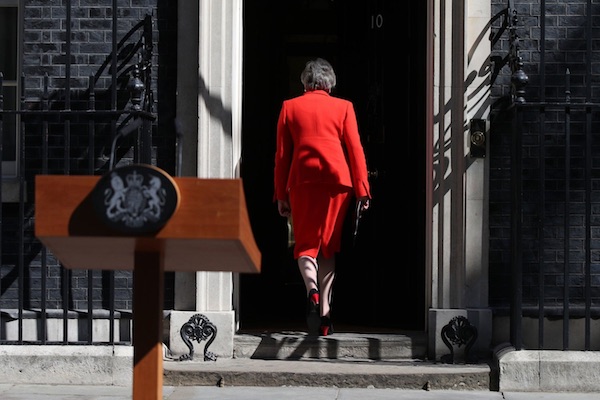
Sinn Féin leader Mary Lou McDonald has warned that the resignation of the British Prime Minister and the Tory leadership contest should not distract from the threats posed by Brexit or derail efforts to restore the Six County Assembly at Stormont.
There has been strong criticism in Ireland of Theresa May after she tearfully announced plans to step down from the office next month. May had come under immense pressure to resign from her party leadership following a deep slide in the party’s support and her failure to cope with the fallout of the 2016 Brexit referendum.
Ms McDonald said May had prioritised a deal with hardline unionism at the last Westminster election over re-establishing the powersharing institutions.
“This Tory/DUP deal has had a negative influence on the political process,” the Dublin Central TD said.
She said the outgoing prime minister had set unrealisable red lines on Brexit and agreed a confidence and supply deal with the DUP that had damaged the north’s political process.
Mrs McDonald said people wanted a resolution to the impasse that had led to Stormont’s collapse more than two years ago.
“An agreement can be reached and a deal can be done but the process must not be derailed nor responsibility abdicated in respect of people’s rights and agreements,” she said.
Ms McDonald also called for an end to “Tory party theatrics and Westminster side shows”.
“The British government has a responsibility to uphold the Good Friday Agreement. There can be no diminution of Irish rights and agreements. We will not be held to ransom by the Tory Brexit agenda and party in-fighting,” she said.
SDLP leader Colum Eastwood said Mrs May’s resignation illustrated how Brexit was a “fundamentally undeliverable prospect”.
He said British efforts to leave the EU had cost its government 38 ministers and two prime ministers.
“It is a doctrine that seeks to sink an axe of simplicity into the delicate layers of political relationships across Ireland and it has broken old political certainties in Britain,” he said.
British Opposition leader Jeremy Corbyn said the Tories had “utterly failed” Britain over Brexit and were unable to improve people’s lives or deal with their most pressing needs.
“Parliament is deadlocked and the Conservatives offer no solutions to the other major challenges facing our country,” he said.
“Theresa May is right to resign. She’s now accepted what the country’s known for months: she can’t govern, and nor can her divided and disintegrating party. Whoever becomes the new Tory leader must let the people decide our country’s future, through an immediate General Election.”
BRADLEY TO FOLLOW
Commentators in the North predicted British Direct Ruler Karen Bradley would be removed from her post by May’s successor.
At talks at Stormont this week, Bradley was accused of deliberately delaying compensation for victims of institutional abuse after she told Stormont parties they needed to answer questions about the stalled legislation.
At a roundtable meeting of the leaders last week, she informed them there were now an additional 11 questions that required answers, although she did not specify what those questions were during the meeting at the Stormont Hotel.
Afterwards, SDLP leader Colum Eastwood accused Mrs Bradley of “disgraceful behaviour”. Sinn Féin’s northern leader Michelle O’Neill said: “It think it’s just not good enough. If there are 15 questions why do we need to wait for Karen Bradley to decide to release the questions?
SUCCESSOR LIKELY WORSE
The main Tory leadership contenders are Boris Johnson, Dominic Raab, Jeremy Hunt, Michael Gove and Andrea Leadsom, none of whom have shown any sympathy for Ireland.
Johnson, the runaway favourite, is openly hostile to Irish nationalism and earlier this year said it was “unconscionable” that killer British soldiers who carried out massacres in Derry and Belfast should face charges. He wrote: “What kind of a world is it – you may ask – where we can put former squaddies in the dock for murder?”
Two of the MPs backing Johnson’s bid to become next prime minister have been to the forefront of a Westminster campaign for an amnesty for soldiers who killed innocent civilians in Ireland.
Johnson was also the guest speaker at the DUP’s annual conference in Belfast last autumn, where he said the British government was making a historic mistake if it did not “junk the backstop”, the agreed policy to prevent a remilitarisation of the Irish border.
He said it was “beyond belief” that the need for peace in Ireland was preventing a hard Brexit. An audio recording emerged last year where Mr Johnson likened concerns about the Irish border to “pure millennium bug stuff”.
![[Irish Republican News]](https://republican-news.org/graphics/title_gifs/rn.gif)
![[Irish Republican News]](https://republican-news.org/graphics/title_gifs/harp.gif)

